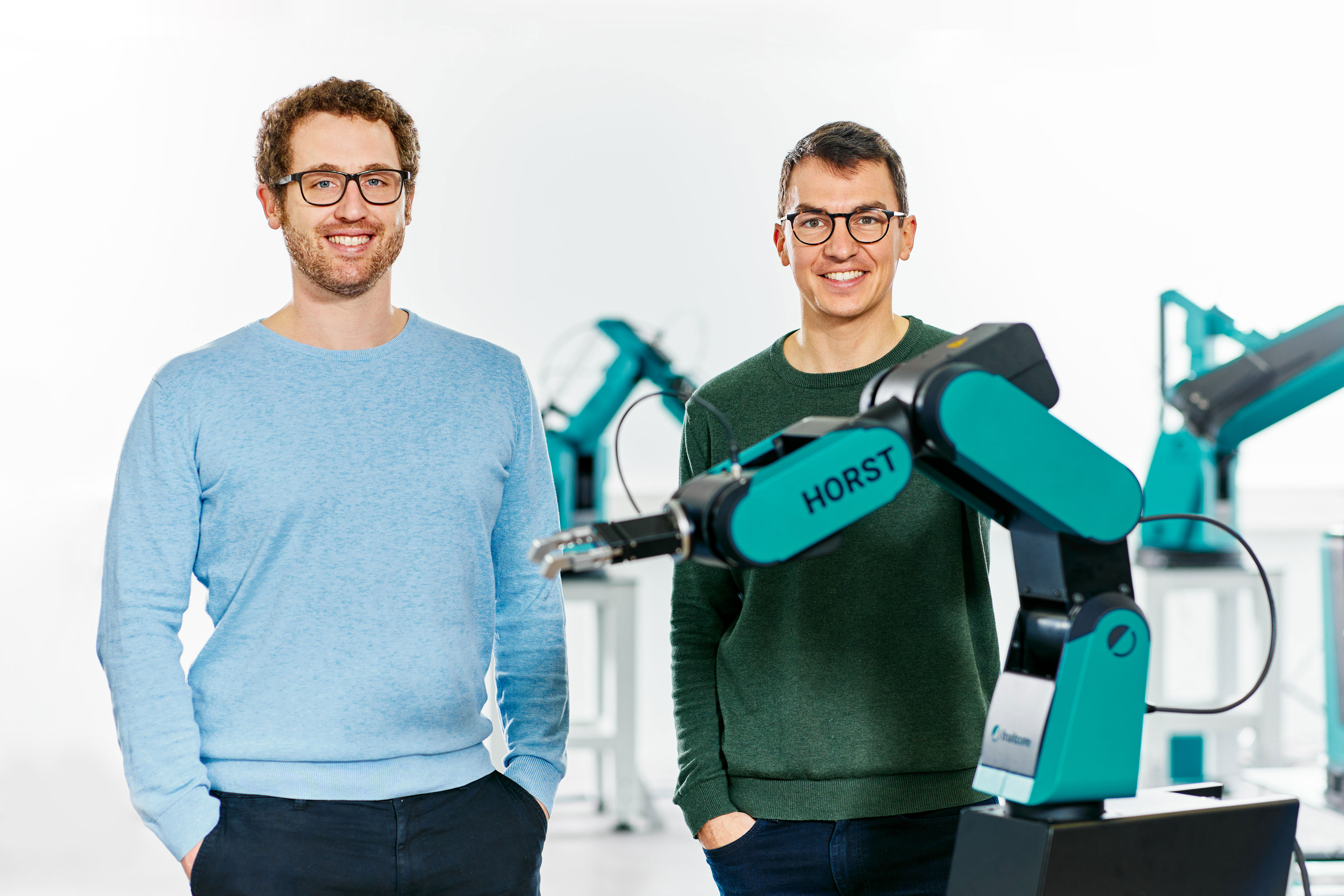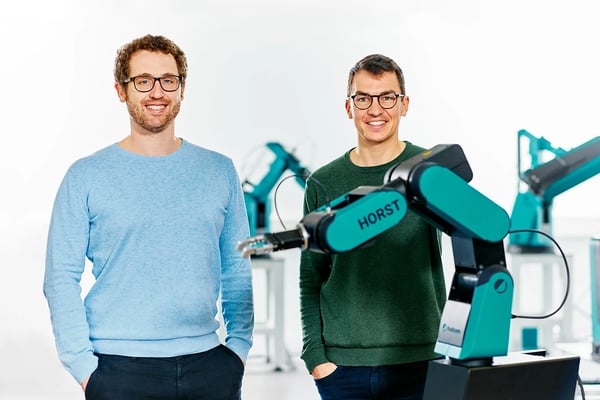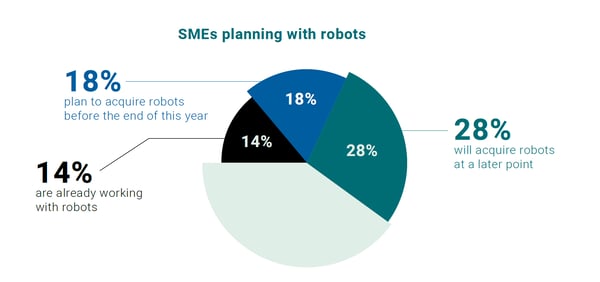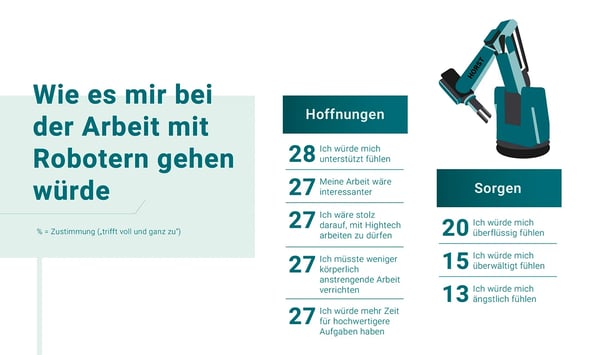3 min read
Press Release: Robots are conquering SMEs according to survey
 Sylvie Rest
:
May 31, 2022 3:44:00 PM
Sylvie Rest
:
May 31, 2022 3:44:00 PM

Almost half of German SMEs (46%) are planning to bring robots in-house, and 14 percent already have them. fruitcore robotics surveyed more than 1,000 German professionals and managers who primarily perform, plan or supervise manual work in companies with 50 to 500 employees to find out what they think about this development.
The basic tenor: positive expectations prevail. Up to now, it was mainly office jobs that had benefited from digitization, according to the majority of respondents (63%), and so it was now "about time" that their own department was also prioritized (66%). Robots could be a good introduction to digitization and automation, according to almost two-thirds. Many professionals hope for very practical improvements in everyday life, for example a reduction in repetitive tasks, quality improvements or the prospect of having to work less with hazardous substances.
Some can also imagine an upgrading of their own workplace: Almost a third say their job would become more interesting (27%) and they would feel pride in working with high tech (26%). The fruitcore survey provides employers with indications of what accompanying measures the workforce would like to see when robots are introduced, and also holds insights for policymakers.
Interest in the introduction of intelligent Digital Robots is growing rapidl
"Everyone is familiar with the large industrial robots that assemble cars or other heavy equipment on production lines. But there is now a new generation of robots that are smaller, more digital, more networked and also affordable for small and medium-sized companies. Because these new 'digital robots' are also very easy to put into operation and can be operated without prior knowledge, they are now finding their way into medium-sized businesses," says Jens Riegger, Managing Director of fruitcore robotics.
"We were a little nervous about sending our survey into the field - too many times we've heard that employees' fear of being replaced by robots is preventing modernization. Our survey shows: Yes, there are worries, but hopes outweigh them by far. The specialists and managers in German SMEs have understood that digitization and automation are central to being fit for the future."
Concerns - and ways to address them
Not all employees have positive feelings about the new robots: one fifth said they would feel redundant if they were introduced, 15 percent said they would be "overwhelmed" and 13 percent were simply afraid of the new developments. Production managers also said they feared the complexity of working with robots (24%). Management must take these concerns seriously. Accompanying measures can facilitate the change: Most important to the respondents are training and upskilling programs that enable them to work with robots (34%).
Organizational matters and good planning are also key: almost a third (32%) say that no employees should work exclusively with robots. In addition, many want a say in which tasks are handed over to robots and which are not (29%). About a third (27%) said that working with robots would give them more time for higher-value tasks - and accordingly want good planning for what new tasks will come their way.
Professionals and managers in companies that already use robots point out more often than average that the clear prospect of salary jumps when taking on higher-quality tasks (35% versus 28% average) or the prospect of a four-day week (37% versus 29% average) can also be attractive accompanying measures.
Hopes - and the way to realize them
Professionals and managers associate the possible introduction of robots with hopes for the company as well as their own workplace. Processes in companies could run faster with robots (65%), productivity (62%) and quality (61%) would increase, robots would represent a competitive advantage (60%) and perhaps also a solution to the problem of the shortage of skilled workers (57%). The latter is still immense, with three-quarters (74%) of respondents saying their companies would have difficulty finding qualified workers or would need a very long time to do so. In addition, robots could make the work environment safer (62%) and free workers from repetitive (63%) and unergonomic (59%) tasks.
In order to realize the hoped-for benefits, SMEs should fully exploit the potential of digital robots. According to the production management respondents, one-third of them plan to do so: 33% would evaluate robot data to improve performance and longevity, 31% would connect them to the cloud to always work with the latest updates (28% would not do so due to security concerns), and more than a quarter (28%) also plan to explore the possibilities of artificial intelligence in connection with robots.
Political support - what professionals and managers want
"Digital robots can pay for themselves within six months on average," said Patrick Heimburger, Managing Director of fruitcore robotics. "They will therefore become widespread in many areas of the economy. Digitization and automation on a broad scale represent a change that should not be underestimated. We therefore also asked experts how politics could accompany this change. Here, too, most are in favor of better education packages, which in my view also make sense, especially in all technical training."

Schools and post-secondary educational institutions should offer better technical programs to better prepare society for robotic automation on a broad scale, say 41 percent of respondents. More than a third (37%) would like to see incentives for private companies to provide better training for change. Exactly one-third would also feel better if there were an unconditional basic income as a "safety net," and a quarter think a robot tax is a good idea that could compensate for reduced income tax contributions if necessary.
Survey methodology
fruitcore robotics commissioned the market researchers from Sapio Research to survey specialists and managers in Germany. 1005 specialists and managers from Germany took part in the survey. The selection focused on specialists and managers who do not work predominantly in an office, but primarily perform manual work or plan and/or supervise manual work. More than 30 percent of the respondents (322 people) were production managers. The survey was conducted at the beginning of April 2022.

